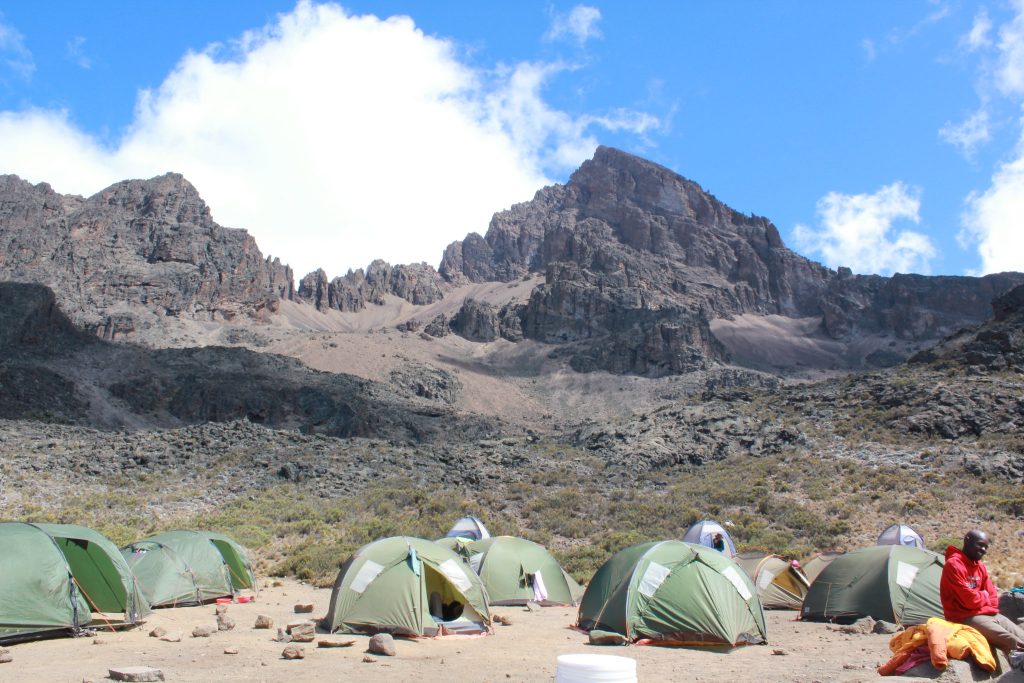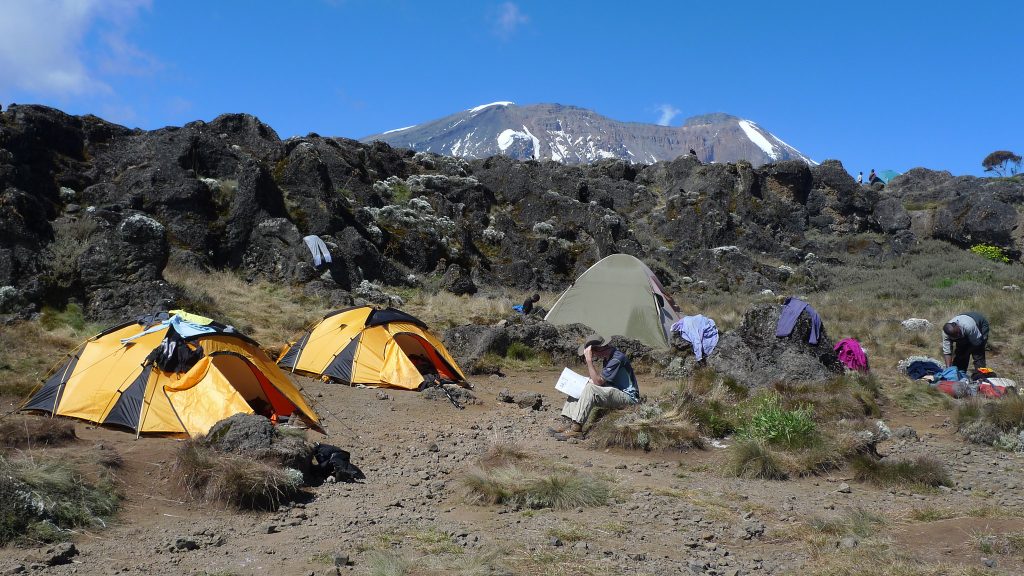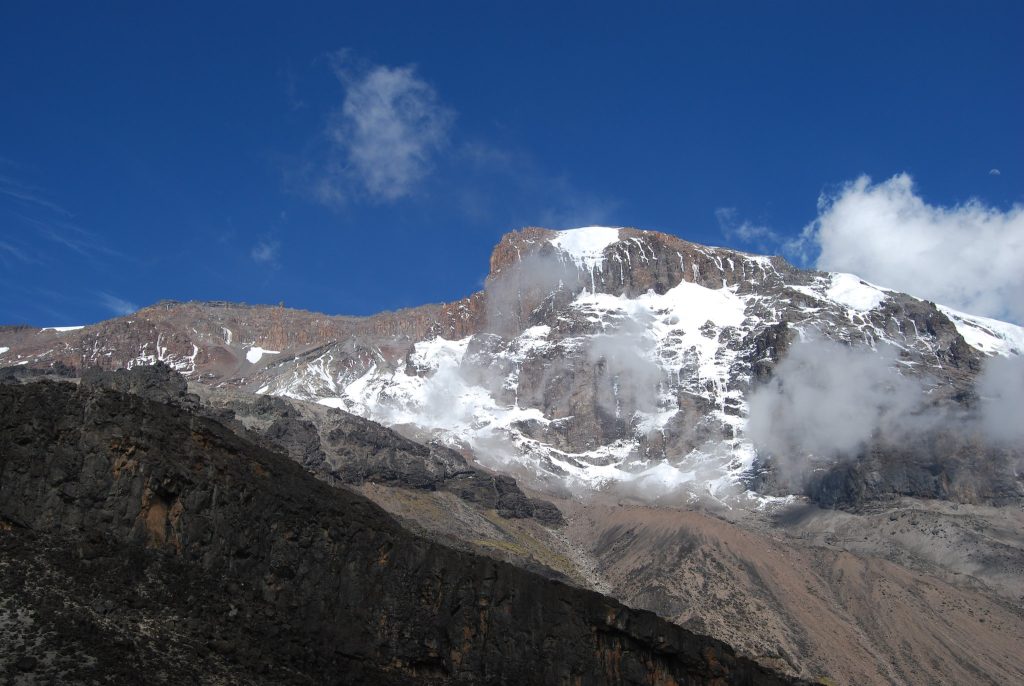6 Days – Umbwe Route
Route Overview
The Umbwe path is an easy-to-follow, short, and steep route. It is the most demanding route up Mount Kilimanjaro and is thought to be exceedingly difficult. Umbwe does not offer the requisite steps for acclimation to altitude because of the fast ascent. Although there is extremely little traffic on this route, the likelihood of success is also very low. Although seven days are advised when tackling this route, it is provided at a minimum of six days. Only extremely fit hikers who are confident in their capacity to acclimatize should attempt the Umbwe route. The Umbwe route is generally not advised, and we advise our clients against using it.
Day by Day Itinerary
Day 1: Arrive in Tanzania
Your guide will pick you up from the Kilimanjaro International Airport and drive you to your hotel in Moshi. Your guide will give you a briefing on your forthcoming trip and conduct an equipment check to ensure you have all the appropriate mountain gear. On this day, the equipment that is lacking can be rented.
Meals: Breakfast, Lunch & Dinner Included
Day 2: Umbwe Gate (1,800m/5,905ft) to Cave Bivouac Camp (2,850m/9,350ft)
Leave Moshi for Umbwe Gate at 8 a.m. There, you can meet our porters, guides, and cooks who will accompany you on your six-day trip to Uhuru Peak, the highest point in Africa. Wait at the gate once you arrive while we register your climb and the porters and guides make any last-minute adjustments. The Cave Bivouac Camp is where you’ll spend the night on your first day; it’s around 6 hours from the gate. The trail has several areas that can be slippery and is steep.Hike through the Kilimanjaro cloud forest’s moss-covered trees. Later on in the trip, the woodland will start to thin and heathers, tall grasses, and wildflowers will start to appear. In order to set up the tent in time for your arrival, porters and cooks will walk ahead.
Elevation Gain: 1,050 meters, 3,445 feet
Hiking time: 4 to 6 hours
Meals: Breakfast, Lunch & Dinner Included
Day 3: Cave Bivouac (2,850m/9,350ft) to Barranco Camp (3,950m/12,960ft)
The trail’s initial segment keeps following the ridge. To get to Barranco Camp after leaving the forest, travel through open moorlands. Due to its surroundings of enormous senecios and lobelias, Barranco is sometimes cited as the Umbwe Trail’s most picturesque campsite. Barranco’s valley location causes it to rise later than the other camps.
Total Elevation Gain: 1,100 meters, 3,610 feet
Hiking time: 5 to 7 hours
Meals: Breakfast, Lunch & Dinner Included
Day 4: Barranco Camp (3,950m/12,960ft) to Karanga Valley (4,200m/13,780ft)
After breakfast, go for Karanga Valley from Barranco Camp. A 1.5-hour struggle up the Barranco Wall kicks off the day. This is the hardest section of the day, and you might need to use your hands in some spots to help you climb. Following a rather level trek to the summit, descend quickly but steeply into the lush Karanga River Valley.
Elevation Gain: 250 meters, 820 feet
Distance: 7 Kilometers
Hiking time: 3 to 5 hours
Meals: Breakfast, Lunch & Dinner Included
Day 5: Karanga Valley (4,200m/13,780ft) to Barafu Camp (4,600m/15,100ft)
Start the climb to Barafu Camp after breakfast. View several of Kibo’s glaciers as well as the intersection where the Machame path and the Mweka descent route meet on the way to Barafu. Hike alongside the Heim, Kersten, and Decken Glaciers on day four. Barafu Camp offers breathtaking views of Kibo and Mawenzi peaks despite the fact that the trail to Barafu travels through alpine desert with minimal flora. As you will need to rise up before midnight for your summit trip, try to get some sleep after dinner.
Elevation Gain: 400 meters, 1,320 feet
Hiking time: 3 to 5 hours
Meals: Breakfast, Lunch & Dinner Included
Day 6: Barafu Camp (4,600m/15,100ft) to Uhuru Peak (5,895m/19,340ft) to Mweka Camp (3,100m/10,170ft)
Start the last ascent to Uhuru Peak at midnight. For the next six hours, hike by the light of your headlamp. The hardest portion of the entire walk is the rise to the crater rim. Up until Stella Point, where the crater rim is located, the walk is extremely steep.
As far as hikes go, the ascent from Stella Point to Uhuru Peak is gentle and not too challenging. But the hike is long and strenuous because of the altitude. The hike around the crater rim takes around an hour. Before starting the descent to Mweka Camp after reaching Uhuru, snap pictures of your guide and the group at the summit. Enjoy views of the mountain, crater, clouds, and glaciers as you descend from Uhuru.
Eat breakfast and take a quick rest at Barafu Camp. Before you get at Mweka Camp, you still have another three to five hours to travel.
Elevation Gain: 1,295 meters, 4,240 feet
Elevation Loss: 2,795 meters, 9,170 feet
Hiking time: 6 hours to the rim, 1 hour to Uhuru, 3 to 4 hours back to Barafu, 4 hours to Mweka
Meals: Breakfast, Lunch & Dinner Included
Day 7: Mweka Camp (3,100m/10,170ft) to Mweka Gate (1,500m/4,920ft)
Finish the adventure by hiking through the jungle to Mweka Gate after breakfast. The trail could get slick after it has rained. To transport you back to Moshi, our vehicles will meet you at the lower station of Mweka Gate.
Elevation Loss: 1,600 meters, 5,250 feet
Hiking time: 4 hours
Meals: Breakfast, Lunch & Dinner Included
Day 8: Departure
After the hike, you have the rest of the day to relax before your trip home. You might visit Moshi town and buy some souvenirs before going to the airport, depending on your travel schedules.
If you want to continue experiencing Tanzania, add-ons like safaris and trips to Zanzibar are also available.
Meals: Breakfast Included
Book Now
Items included:
- Professional, experienced, mountain guides:
- All Park fees
- Rescue fees
- All meals while on the Mountain
- Arrival and Departure transfers
- Guides, Porters, cook salaries and park fees
- Quality Mess tents with table and chairs
- Large portions of fresh, healthy, nutritious food
- Clean, purified drinking water
- Crisis management and safety procedures
- Fair and ethical treatment of porters
- Flying Doctors insurance (AMREF) during the safari
Items excluded:
- International Flights
- Alcoholic and soft drinks not included
- Visa fees
- Tips
- Personal spending money for souvenirs etc.
- Travel insurance







